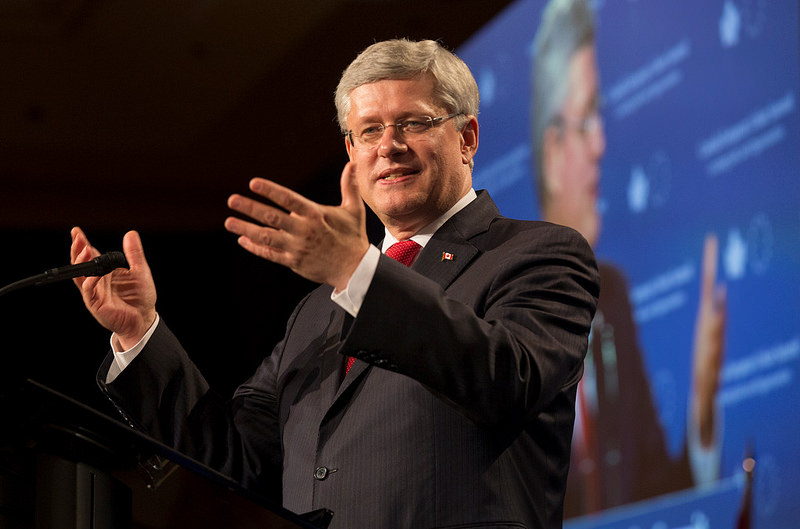Like this story? Chip in to keep labour stories like these coming.
By now Stephen Harper should be down to the low teens in popularity, in territory last occupied when Conservative Prime Minister Brian Mulroney was at 11 per cent, just before he decided to leave politics in 1993.
Yes, 60 per cent of Canadians disapprove of Harper as a leader say EKOS Politics. But an astonishing 50 per cent think the Harper government has the country going in the right direction.
At rabble.ca we fear his government can be re-elected, despite the abysmal Harper record, and in spite of the threat his return to power represents for Canadians.
Not all rabble.ca readers (well-informed as they are) would have noticed that following a high in June of 2008, the Toronto stock market (TSX index) proceeded to lose 50 per cent of its value bottoming out in March 2009, and then bouncing back in 2011 to its previous high.
People with a stake in stock market performance remember it has recovered, and have noted an average total return of above nine per cent in a recent 10-year period. Whatever reasons can be given to change government — and they are numerous — stock market players are unlikely to vote out the government. Solid stock market returns after the crash help explain why the Cons poll at about 35 per cent.
Political scientists think that unemployment rates matter in determining how people will vote. It is rare voters re-elect a government when the unemployment rate climbs significantly during its time in office.
The employment situation stinks in Canada. The numbers are nowhere as good as the government pretends. Employment levels are not back to the levels achieved prior to the Great Recession of 2007-08.
Even when temporary foreign workers are added to announced employment gains (hard to believe, but it’s done) the picture hardly improves. Bad as the employment scene is, and future prospects are worse, the bad jobs picture is not bad enough to defeat Stephen Harper.
The Harper government target their political base constantly. No government in Canadian history has focused every action on pleasing about 35 per cent of the population and ignoring the rest of us. This is the essence of Harperism.
The legitimacy of the government and what it does is not questioned by the Cons’ supporters. They get fed what they want. Tough on terrorists, check. Lower taxes, check. Cutbacks to social spending, check. But for significant numbers of Canadians, the Harper Cons lost their legitimacy as a government by following a narrow ideological agenda.
People who want to defeat the Harper Conservatives have to wrestle with what the esteemed German social theorist Jurgen Habermas famously called a legitimation crisis. Simply put, many Canadians no longer believe that power being exercised in their name is rightful. The political system as a whole is no longer believed to work.
When in 1993 Canadians voted massively to throw out the Conservatives, it was expected that changes would ensue. Instead the Chrétien-Martin Liberals continued with the same economic policies introduced by the Conservatives.
Disillusioned with political outcomes, people give up, and declare a pox on all political parties. The abstention rate in federal elections has been running in the 40 per cent range.
The people who stay home multiply the strength of Conservatives who tend to turn up and vote. The 25/60 rule says that if 25 per cent of eligible voters vote Conservative, and only 60 per cent of the population bothers to vote, the Conservatives win 40 per cent of the total vote and over one-half of the seats in Parliament.
The Canadian Labour Congress has been holding meetings across Canada to engage trade unionists in the electoral process. The goal is to educate union members on the issues at stake in the election.
It’s no exaggeration to say that the quality of life in the country depends on who gets elected to Parliament. Whether it be pensions, child care, minimum wages, climate change, heath care, or labour legislation, another Conservative majority government will have a huge negative impact on Canadian workers.
Activist members of Parliament can make a difference not just on policies adopted by their own parties but by on public opinion. It took years but a cause championed by former NDP MP Svend Robinson ultimately led to a favourable Supreme Court decision on assisted suicide.
People who still believe electoral politics are important, and want to put a new face on government have to deal with an unjust electoral system. First-past-the-post elections in 338 federal ridings will produce phony majorities behind elected members. Many voters will not see their votes reflected in the riding-by-riding results.
The obvious remedy, electoral reform through the introduction of proportional representation, requires a government to throw out the system that elected it, not a good betting proposition.
Mobilizing people is the only way to defeat the Harper Conservatives. Overturning the destructive policies the Cons have introduced requires electing members of Parliament who stand for something, and are not afraid to speak up. Potential MPs have to declare their allegiance to the riding.
However dangerous and twisted the Cons have been in government, Stephen Harper has delivered for his supporters. It is what makes him such a serious threat to repeat in government.
Duncan Cameron is the president of rabble.ca and writes a weekly column on politics and current affairs.
Photo: pmwebphotos/flickr
Like this story? Chip in to keep labour stories like these coming.




